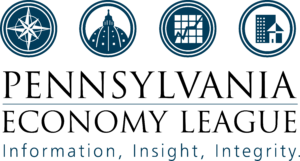

NEWS RELEASE
FOR IMMEDIATE RELEASE
TO NEWS/CITY DESK EDITOR
CONTACT:
Debbie Bitting, Pennsylvania Municipal League, 717-236-9469, ext. *223, dbitting@pml.org
Lynne Shedlock, Pennsylvania Economy League, lynne.shedlock@pelcentral.org
Pennsylvania Municipal League and Pennsylvania Economy League Present New Study:
It’s Not 1965 Any More – State Tax Laws Fail to Meet Municipal Revenue Needs
Pittsburgh, PA (October 7, 2022) – The Pennsylvania Municipal League and Pennsylvania Economy League have published a new study that demonstrates how the current local taxation structure developed in 1965 does not meet today’s municipal revenue needs. The report was debuted today during the Municipal Leadership Summit, a convening of elected and appointed municipal officials from across the state, at the Omni William Penn Hotel in Pittsburgh.
This partnership and publication is in response to The League’s Strategic Plan that called for an updated report on Pennsylvania’s local taxation structure. Pennsylvania’s municipal tax authorizations have failed to keep pace with modern realities, and municipalities need more flexible revenue options just to keep the lights on.
“The League is pleased to have partnered with the Pennsylvania Economy League to publish the ‘It’s Not 1965 Anymore — State Tax Laws Fail to Meet Municipal Needs’ report,” said League Executive Director John Brenner. “As the case studies clearly point out, we need to rethink how we fund public safety and other municipal services as the revenue tools are extremely limited for local communities to meet the challenges of today’s economic realities. Local officials are creative and innovative in spite of not having the resources to provide essential services for the public that deserves and expects results. In order to make our Commonwealth truly economically competitive, we must give local leaders a menu of revenue options that steers us away from nearly total reliance on property taxes. A great deal has changed in our state and in our communities since 1965. It’s time to address how we pay for police, fire, public works and other local services.”
Much has changed in the landscape of local government since 1965 – population shifts, aging housing stock in older core communities, increased cost of municipal services, increases in tax-exempt properties receiving services.
“As Mayor of Lancaster, I get to celebrate the many successes of our city, but looming over our progress is a structural deficit that can undermine our success,” said League President Mayor Danene Sorace. “Pennsylvania’s outdated tax laws are setting us up for failure through over-reliance on property tax revenue. We need more tools in the tool belt to raise revenue to fund mandated services like public safety. Lancaster is not alone in this struggle. Pennsylvania’s municipalities are waiting on action from Harrisburg to avoid crippling financial strain.”
Currently, new tools are only available to communities that have become fiscally distressed. Municipalities need access to these proven tools before fiscal distress sets in. Tools should be optional to allow each community to decide the best mix based on the make-up of the community such as: increased Local Services Tax, flexibility to increase the Earned Income Tax, Payroll Tax, county or regional Sales Tax, Drink Tax, regular reassessment.
“PEL research demonstrates that municipalities are struggling to pay for critical services like police, fire and public works because of inadequate revenue tools that are largely stuck in the 1960s,” said LeeAnne Rogers, PEL Chief Executive Officer. “Our report recommends modernizing the system using existing models that will provide municipalities with greater flexibility to respond to local public service needs.”
Case studies for this report include: Cities of Altoona, Bradford, Hermitage, Lancaster, Lock Haven, Pittston; Upper Chichester Township and Indiana Borough.
The Municipal Leadership Summit, October 6-9, is a conference of the Pennsylvania Municipal League, the Pennsylvania State Association of Township Commissioners and the Pennsylvania Career Fire Chiefs Association, where municipal officials have convened to share resources and innovative ideas, discuss issues of mutual concern, and participate in a wide-array of educational and professional development sessions designed to address the ways and means of meeting the pressing challenges of municipal management and good governance.
# # #
About The Pennsylvania Municipal League
The mission of the Pennsylvania Municipal League is to strengthen, empower and advocate for effective local government. The League is a nonprofit, nonpartisan organization established in 1900 as an advocate for Pennsylvania’s 3rd class cities. Today, The League represents Pennsylvania cities, boroughs, townships, home rule communities and towns that all share their municipal policy interests. The Board of Directors oversees the administration of a wide array of municipal services including legislative advocacy, publications, education/training, consulting-based programs, and group insurance trusts. For more information, please visit PML.org. Join the conversation on Twitter @PAMunicipalLeag and facebook.com/PaMunicipalLeague – #MunicipalLeadershipSummit2022, #StrengthThroughEngagement.
About PEL
Pennsylvania Economy League Central LLC is a 501(c)(3) non-profit, non-partisan educational and research organization financed in part by memberships from individuals, businesses, associations, institutions and foundations that share our vision for a better Pennsylvania. For over 80 years, PEL has provided technical assistance to state and local governments, independent research on state and local government issues impacting our community, and civic education to inform government officials, business leaders and the general community on key public policy issues.